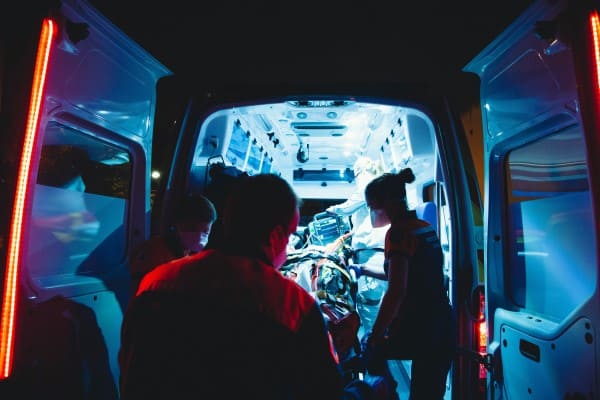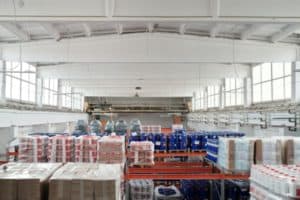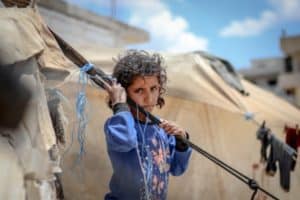This page contains affiliate links. This means if you a follow a link and make a purchase, at no additional cost to you, Humanitarian Careers will receive a commission. Thank you for supporting the site.
As part of an emergency response, humanitarian NGOs regularly recruit paramedics in their teams. Trained paramedics can bring a range of vital experiences as well as technical knowledge to humanitarian responses. There are several types of job that paramedics can work in as part of a humanitarian response. These include working directly as paramedics assisting those affected by disasters and conflicts and needing emergency care, as well as managerial, logistical and training roles.
Medical Coordinator
Trained paramedics working in humanitarian emergency responses often work in the position of Medical Coordinator. The Medical Coordinator manages an NGO’s humanitarian health programmes and the job needs formal medical training. Qualified paramedics, having completed extensive medical training, are well suited to the job of Medical Coordinator in a humanitarian emergency.
The Medical Coordinator is a senior management position within a humanitarian response. It is often the highest medical position on a humanitarian mission. The Med Co has overall responsibility for the humanitarian health and medical programming and so needs to be fully qualified. Paramedics often work as Medical Coordinators as their medical training is highly needed in the job.
NGO’s recruit paramedics for the job of Medical Coordinator either through directly advertising for the role or from a roster of pre-approved and qualified staff. Paramedics looking to work in humanitarian aid should apply to both Med Co roles as advertised and look to join NGO’s emergency deployment rosters.
As the Medical Coordinator is a very senior role, paramedics looking to work in humanitarian aid in this job should have prior humanitarian aid experience. Often paramedics work for a time in their home countries health system before joining a humanitarian NGO in a less-senior medical role, and then move up to become Med Co.
Paramedics working as Medical Coordinators during a humanitarian emergency often manage large teams. As the Med Co is responsible for the entire health programme of a humanitarian mission, they often oversee a range of medical staff. Trained paramedics are recruited by humanitarian NGO’s to work as Medical Coordinator’s as they have the medical skills needed and often have team management experience.
Paramedic – Emergency Response Team
When humanitarian disasters occur, NGO’s deploy emergency response teams directly to the site to assist. These emergency response teams comprise a wide range of roles and often include paramedics. Especially when natural disasters such as earthquakes or floods occur, humanitarian NGO’s rapidly deploy paramedics as part of their emergency response teams.
As part of an emergency response team, paramedics deployment into humanitarian crises either work directly assisting people affected by the disaster, or work to train local medical staff to improve their response. Often first responders will work as paramedics directly whilst local health facilities recover, before moving to more capacity development role assisting local health systems to be better prepared in future.
Most humanitarian NGOs that respond to ‘rapid-onset’ crises such as earthquakes and floods retain paramedics as part of their emergency response teams. Humanitarian NGOs can also directly recruit paramedics once a disaster has hit to be part of their emergency response team after they have assessed that training paramedics is what the response needs.
Paramedics deployed into humanitarian crises as part of an emergency response team are often pulled from an emergency roster held by the NGO. It is common for paramedics to continue to work in their home countries health systems, but be on-call for humanitarian NGOs to deploy abroad when a disaster or crises strikes.
As well as deploying as part of an emergency response team to a humanitarian disaster such as earthquakes or floods, NGO’s also deploy paramedics to conflict zones to assist people. Often paramedics deployed in a humanitarian response to an ongoing conflict work with local paramedic teams to improve their response and increase their capacity.
Humanitarian Health Online Courses
If you are a paramedic and looking to work in humanitarian aid, a great addition to your CV is an online course. We think the Emory University course on Health in Complex Humanitarian Emergencies is one of the best. It covers the key concepts of healthcare in humanitarian settings. Follow the link to the course’s page.
We also highly recommend the University of Copenhagen’s online short course in Non-Communicable Diseases in Humanitarian Settings. It only takes around 15 hours to complete, and we think it’s ideal for those wanting to work as a paramedic in the aid sector. Click the link to find out more.
Another online course we recommend for those looking to work as a humanitarian paramedic is the Manchester University Global Health and Humanitarianism course. It’s a fantastic overview of both the theory and practice of humanitarian aid and public health. The link is to the course’s page with more information.
Community Health Worker
Community health workers are a key part of long-term health development projects as well as humanitarian responses. NGO’s often recruit paramedics as part of their community health teams as they have strong medical qualifications and practical previous experience in medical work. Community Health Workers conduct outreach in a community to promote health messages and refer cases as needed.
Paramedics wanting to work in humanitarian responses should apply to NGO’s to be Community Health Workers. Often Community health workers are employed from the community affected by the crises, so local paramedics looking to join humanitarian NGO’s and serve their community should apply to for jobs as Community Health Workers.
Community health workers are often a key part of an NGO’s humanitarian response. Imbedded in the community affected by the crises, paramedics working as community health workers know their community and it’s needs, and use this knowledge of identify cases and provide assistance and referrals, as well as providing health information to the community.
Humanitarian NGO’s recruit paramedics as part of their community health work team locally as it is important that they are trusted as part of the community and know the society well. Local paramedics are very well placed for this. Community health workers often go door-to-door in a community to conduct health work and local recruited paramedics are well trained for this kind of work.
As paramedics working as community health workers as part of a humanitarian response are recruited locally, trained paramedics looking to work internationally with a humanitarian NGO are not best suited to jobs as community health workers. Often teams of community health workers are overseen by a management position such as Medical Officer or Emergency Response Officer – jobs that NGO’s internationally deploy paramedics into.
Emergency Response Officer
Emergency Response Officers’ manage the implementation of a humanitarian NGO’s emergency programmes assisting those affected by sudden-onset disasters. Paramedics looking to work in humanitarian aid should apply to be emergency response officers. Paramedic training means they are well suited to managing emergency projects and have the technical medical skills needed.
When a humanitarian crises hits, emergency response officers are deployed to manage a range of response programmes. Tasked with overseeing the implementation of humanitarian projects in emergencies, response officers run the day-to-day humanitarian response. They are overseen by senior management. Paramedics are often recruited as emergency response officers.
Paramedics are usually recruited in the role of Emergency Response Officer to run health programmes. This can include after rapid-onset crises such as earthquakes and floods, as well as conflict and refugee responses. Paramedics recruited as emergency response officers are managed by senior humanitarian staff but use their paramedic training to ensure the humanitarian response is implemented correctly.
Emergency response officers are either recruited by humanitarian NGOs directly for a specific response – usually advertised locally or on the NGO’s website, or through a deployment roster. Paramedics looking for jobs as emergency response officers in humanitarian crises should sign up to the emergency rosters of medical NGOs.
Although often emergency response officers require medical training when overseeing health interventions, the role of emergency response officer is tailored very much to the specific response needs. Paramedics should focus on jobs as emergency response officers in crises that require health programming as these need trained medical staff in the role.
Health Programme Manager
The Health Programme Manager is responsible for managing health projects within a humanitarian response. As the Health Programme Manager needs to be medically trained, often humanitarian NGO’s recruit paramedics for this role. The Health Programme Manager is a senior position overseeing officer level staff and community health workers who are directly implementing the project and may also be paramedics.
Paramedics working in humanitarian responses as Health Programme Managers over see all aspects of the project, including ensuring logistics, finance, admin, project management and correct implementation. Health projects require technical medical knowledge to oversee and so humanitarian NGO’s often recruit paramedics for this job.
Another key role of the Health Programme Manager is to manage the project staff. Often the Health Programme Manager will line manage medical and non-medical staff, including doctors, nurses, paramedics and community health workers, as well as logistics, finance, HR and admin staff. As the Health Programme Manager is responsible for medical staff, they need to be medically trained and are often paramedics.
The Health Programme Manager is one of the key management jobs in an NGO’s humanitarian response. Another important part of the health programme manager’s role is to write donor proposals and manage the current funding grants of a health project. In order to design medical interventions, often NGO’s recruit trained medical staff, such as paramedics, to the job.
As the Health Programme Manager is responsible for all aspects of the medical project’s implementation, applicants for the job need to be both medically trained and have project management experience. Paramedics looking to work in humanitarian aid in the role of Health Programme Manager need previous humanitarian experience combined with their paramedic qualifications.
Medical Logistician
Medical Logisticians oversee the supply chain of medicines needed in a humanitarian response, as well as the required warehousing, pharmacy and transportation. Paramedics with experience of managing medical supplies can work in humanitarian NGO’s in medical logistics roles. As the role of Medical Logistician requires previous training in handling medical supplies, paramedics are well trained.
The role of Medical Logistician in a humanitarian response oversees the procurement, import, supplying and moving of medical supplies required to run medical projects. A crucial role to ensure quality standards are met and supplies arrive and are used in medical programmes correctly, humanitarian NGOs recruit staff experienced in handling medicines and medical supplies for the job, such as paramedics.
Another key aspect of the Medical Logistician job in a humanitarian response is the warehousing and storing of medical supplies needed for the response. Often in humanitarian emergencies medical facilities and storage units are damaged and so improvised facilities need to be put in place to warehouse medical supplies. Paramedics are well trained for this as they have experience of reacting quickly in medical emergencies and ensuring medicines used are correctly stored.
Medical logisticians working as part of a humanitarian response also oversee the transportation of medicines and medical supplies. Paramedics are highly trained in how medicines can be moved and so are often employed as medical logisticians by humanitarian NGOs. Usually, medical supplies need to be careful controlled in their movement, such as needing to be kept cold, and paramedics often have training needed to oversee this.
Working as a medical logistician in a humanitarian emergency is demanding and challenging. It is crucial to ensure medicines and medical supplies arrive where they are needed and are safely stored and moved. Paramedics wanting to work in humanitarian response are well positioned to work as medical logistician for humanitarian NGOs.

Medical Officer
The Medical Officer works under the supervision of the Medical Coordinator or Health Programme Manager. They are responsible for the direct implementation of humanitarian medical projects. As they work directly with medical teams, the Medical Officer needs to be qualified and often paramedics work in this role.
Medical Officers working in humanitarian responses often take on specific roles, such as doctors, nurses or pharmacists. It is common for paramedics to work as Medical Officers for humanitarian NGOs in their emergency response. This can either be in project management type role or specifically as a paramedic.
Medical Officers who work in a project management role oversee the implementation of health and medical humanitarian projects. They are responsible for project reporting, financial updates, ensuring logistics are in-place and daily project management. Humanitarian NGOs recruit paramedics for this role because prior experience working in medical roles is needed to manage humanitarian health projects effectively.
As well as working in a Medical Officer role for a humanitarian NGO overseeing project implementation, paramedics can work in most traditional medical roles as Medical Officer’s as well. Humanitarian emergency responses result in people needing medical assistance and often paramedics are recruited to assist. Sometimes paramedics working as Medical Officers for a humanitarian NGOs will combine project management and paramedic duties.
The Medical Officer is a more junior job within a humanitarian response. Usually, humanitarian NGOs will recruit for medical officers locally, as opposed to deploying an international staff member. Paramedics looking to work in humanitarian responses as medical officers are usually nationals of the country they are working in. Paramedics looking to work internationally should gain more experience and apply to the role of Med Co, Health Programme Manager or Medical Logistician.
Capacity Building Manager
One of the key jobs of humanitarian NGO’s is to train staff in countries affected by humanitarian disasters and conflicts so that they can better manage their local responses. Building national capacity creates a more sustainable humanitarian response, as well as ensuring local actors can better respond to future crises.
The role of Capacity Building Manager is to oversee an NGOs effort to train and increase the knowledge of local staff. Paramedics working in humanitarian responses can work as capacity building manager overseeing the training of local paramedic staff. This allows local paramedics from places affected by crises to gain international level experience and better training.
Paramedics working as Capacity Building Managers can focus on training local medical staff on specific roles, such as improving their knowledge of paramedic work. This often involves running training sessions, working alongside local paramedic staff and providing better equipment to improve local paramedic responses.
As well as directly training staff, paramedics working as Capacity Building Managers within a humanitarian response can work to improve an organisations way of working. This requires improving how local NGOs, health ministries, hospital and clinics run their systems, as well as providing improved tools and practices that can be rolled out across the organisation.
Paramedics working for a humanitarian NGO in the role of Capacity Building Manager use their training and knowledge from working in their home countries health systems to train local staff and improve national organisations. This allows for those from areas affected by humanitarian crises to sustainably improve their response through increased knowledge of technical areas, such as paramedic work.
If you want to learn more about how to work as a humanitarian paramedic, explore our list of the top humanitarian health online courses here.






